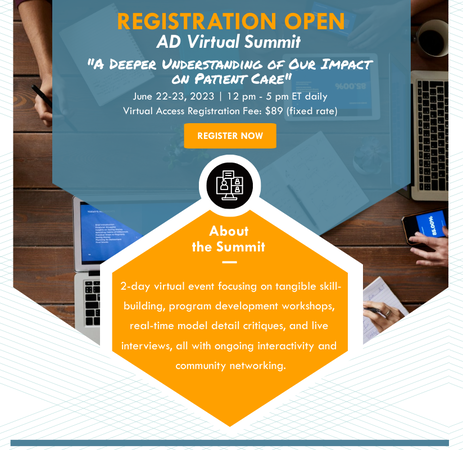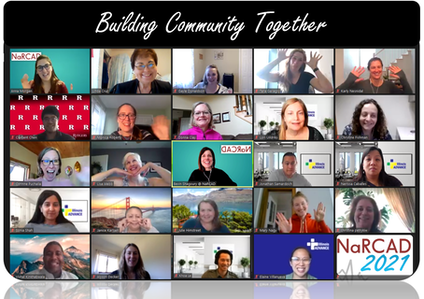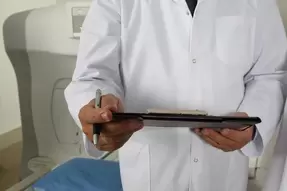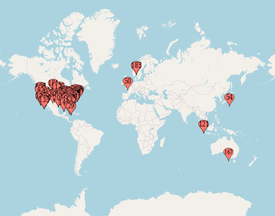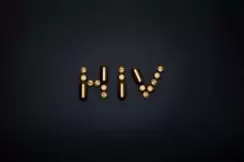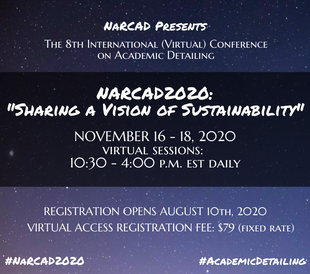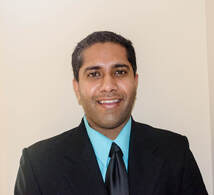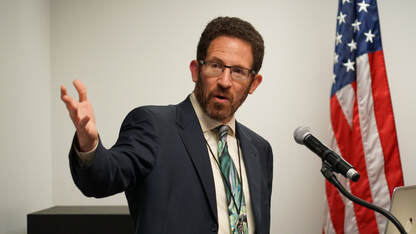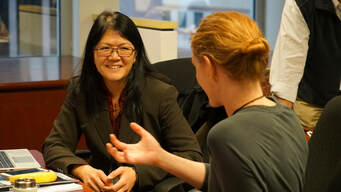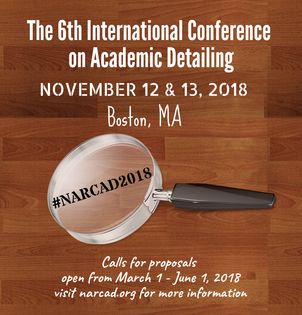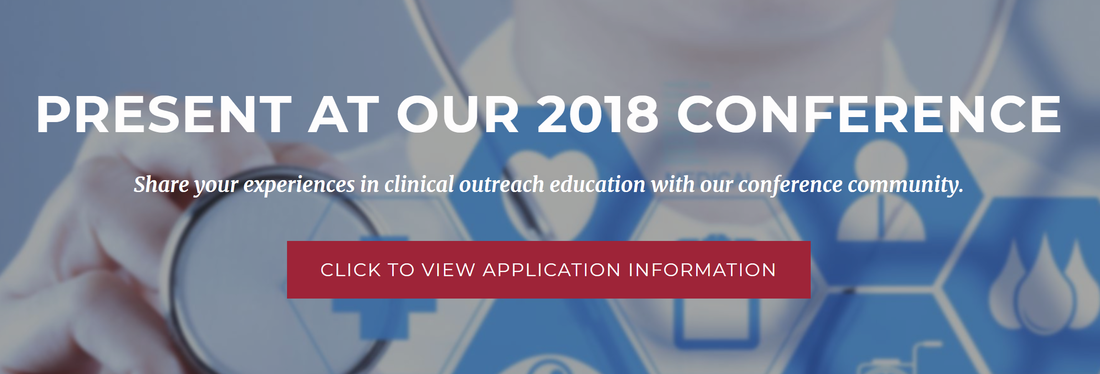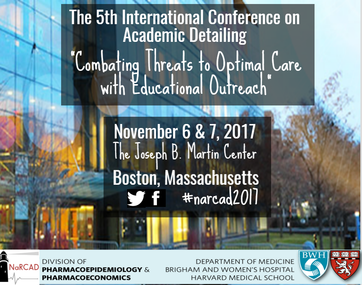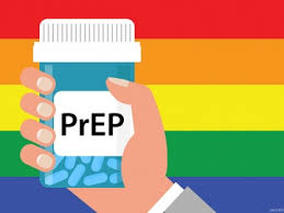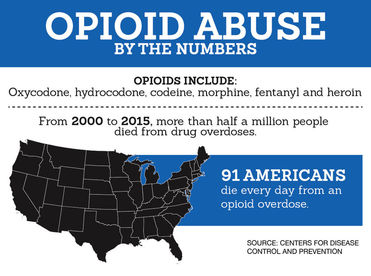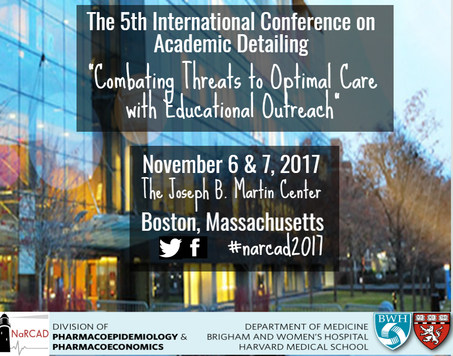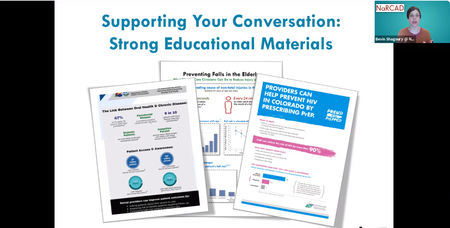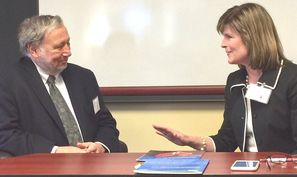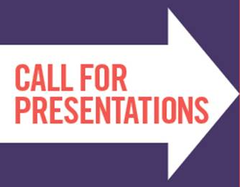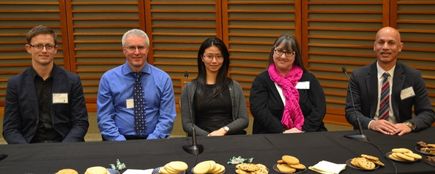|
Anna Morgan-Barsamian, MPH, RN, PMP, Senior Manager, Training & Education, NaRCAD Tags: Stigma, Evidence-Based Medicine, Health Disparities, Conference Missed our event? Check out the AD Summit videos and materials on our Summit Hub.  We’re fresh off of the excitement of hosting our Academic Detailing Virtual Summit, “A Deeper Understanding of Our Impact on Patient Care.” In prioritizing patient-informed care more than ever before, we explored patient narratives through live interviews, workshops, and special panels, all within a virtual space. Innovations included AD for criminal justice involvement, care delivery redesign for veterans, affirming care for transgender and nonbinary people, and patient-informed communication on sex positivity in HIV prevention. Take a peek at some of the highlights from our event below! AD Fireside Chat: A New Spin on a “Keynote Address” We opened our AD Summit with a real-time interview featuring the originator and co-founder of NaRCAD, Dr. Jerry Avorn, and the National Director of the Veterans Affairs Pharmacy Benefits Management Academic Detailing Service, Melissa Christopher. Audience members were excited to throw ideas around and ask questions about:
Program Development Workshops: Attendees Led the Charge! Our revamped course catalog of workshops invited attendees to be in the director’s seat, as well as behind the scenes as co-creators in small groups. Participants created resources that we’ve published on our website and social media channels, sharing creativity and expertise with the larger AD community. Our workshops covered a wide range of topics including:
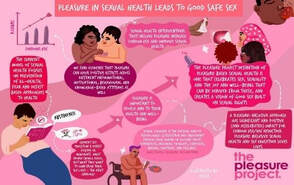 The Pleasure Project The Pleasure Project Special Panel: Understanding Critical Care Needed for Formerly Incarcerated Patients The outstanding team from New York City Department of Health and Mental Hygiene (NYCDOHMH) shared their groundbreaking detailing campaign, “Public Health Detailing for Criminal Justice Involvement”, with an audience that was hungry for innovation around inclusivity. The NYCDOHMH team shared NYC clinicians’ understanding of formerly incarcerated patients’ care, including clinicians who met the campaign with stigma, and those who were grateful to see such a campaign being implemented. Best Practices Spotlight: Prioritizing the Patient Experience For the first time in NaRCAD’s history, we highlighted leaders in the field who’ve been prioritizing the patient experience. The San Francisco team created space for conversation and discussion about gender-affirming care and ways to encourage safe clinical environments for transgender and nonbinary individuals through language, storytelling, and community outreach. We also heard from the Arizona team about the importance of pleasure being part of a patient’s sexual health history and the role of a detailer in supporting these conversations between clinicians and patients. 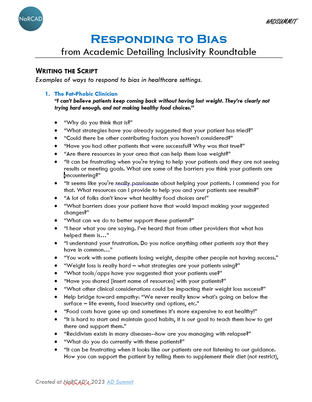 Inclusivity Roundtable: Real-time Script Creation We wrapped up our AD Summit with a roundtable session where attendees co-created a scripting resource to empower detailers to combat stigma during visits. We asked attendees to come up with responses to the stigmatizing comments below. A five-page resource was created in 60 minutes! 1. “I can’t believe patients keep coming back without having lost weight. They’re clearly not trying hard enough, and not making healthy food choices.” 2. “I don’t want those patients at my practice. They’re so difficult to handle and are really just looking for another opioid prescription. Treatment won’t work for them.” 3. “I’m so tired of keeping up with all these different pronouns. You’re either a man or a woman. It gets in the way of providing care.” 4. “I don’t need to use an assessment tool. I can always tell when someone’s at high risk of contracting HIV.” We want to continue these conversations, hear about your team’s innovations, and share resources in person this fall at our annual conference in Boston, MA. We hope to see you there! -The NaRCAD Team A special thank you to all of our AD Summit attendees and presenters as well as our partners at the Agency for Healthcare Research and Quality. For more information on our presenters, you can view the AD Summit Program Book. Have thoughts on our DETAILS Blog posts? You can head on over to our Discussion Forum to continue the conversation! Anna Morgan-Barsamian, MPH, RN, PMP, Senior Manager, Training & Education, NaRCAD Tags: Conference, Health Disparities We have exciting news at NaRCAD! We’re hosting our first-ever Academic Detailing Virtual Summit on June 22 & 23 from 12-5 pm ET. We’ve listened to what you’ve asked for, so we’re prioritizing hands-on skill-building, program development workshops, roundtables, and live interviews, with an emphasis on high interactivity and networking opportunities! How is this different than our annual conference? It's unique in three ways: more creativity, more patient voices, and more in-depth workshops. Our Summit invites our community to build real-time resources with one another – it's a chance to create as much as to learn. Our lens will focus more on patient-informed care as we move closer to examining patient narratives. Each day, you’ll choose a workshop track where you’ll connect with experts and community members on topics that matter most to you. Here’s a sneak peek of our program development workshops (to view the entire agenda, visit our AD Summit webpage): Day 1 Program Development Workshops:
Day 2 Program Development Workshops:
Join us! Registration is NOW OPEN. You can access all the presentations and one workshop per day for a fixed rate of $89. As a special promotion, the first 10 people who comment on this blog will receive free registration for the event. Hurry – you don’t want to miss this!
We look forward to learning from all of you. See you there! -The NaRCAD Team Can't join our event? Join us at our annual conference in November in Boston, MA! By Anna Morgan-Barsamian, MPH, RN, PMP, Senior Manager, Training & Education, NaRCAD An interview with Jennifer Carefoot, BSc, Pharm, Academic Detailing Pharmacist, BC Provincial Academic Detailing (PAD) Service. Tags: Conference, COVID-19, Detailing Visits, Evidence-Based Medicine  Anna: Hi, Jen! Thanks for joining us on DETAILS today. Earlier this year, your team developed a detailing campaign in one week for the new COVID-19 treatment, Paxlovid, and presented on your work at our NaRCAD conference. I’m excited to learn more about this campaign. Before we jump in, can you give us some background about your organization? Jen: The British Columbia Provincial Academic Detailing Service (BC PAD) launched in 2008 and provides academic detailing to the province of British Columbia. We have 12 full-time pharmacist detailers for the entire province. The program is publicly funded by the BC Ministry of Health and our topics are chosen based on their relevance to primary care clinicians. Here are some quick facts about our program:
 Anna: Your team connects with many clinicians covering a vast geographical area! Can you walk us through the one-week development of the Paxlovid campaign that you presented on at our conference? Jen: Paxlovid was approved in Canada on January 17, 2022. The Province of BC quickly received doses and urgently needed educational sessions for clinicians in the province for safe and appropriate use of this somewhat complicated medication. The PAD team had the expertise in delivering pharmacotherapy and education through detailing visits; we worked with the Ministry of Health and the COVID Therapeutics Committee (CTC) to quickly develop materials. We were out in the field detailing within a week! Anna: That’s an impressive turnaround time to get your team prepared and out in the field! Were clinicians aware of Paxlovid when your team started detailing on the topic?  Jen: Paxlovid was getting a lot of press in the media at the time- it was the first oral treatment readily available for COVID-19. Clinicians knew they would have to know about this medication since their patients would be asking about it. Anna: New information was coming out every day in the media, which isn’t very common for other detailing topics. How was your team able to stay up to date on the emerging evidence on Paxlovid and continue to keep clinicians up to date? Jen: Our team was able to stay up to date through the excellent communication between our PAD director, Terryn Naumann, the CTC, and the Ministry of Health. We would receive updates via email or video conference daily. We also frequently met internally to share questions, successes, and challenges that we were experiencing in the field. To keep clinicians up to date, we chose to not provide them with the PowerPoint presentation from the detailing visits because the information and evidence was constantly changing. We’ve created 24 versions to date! Instead, we emailed a one-page resource to clinicians after our visits that included links to online resources that were updated in real time.  Anna: That’s one of the benefits of sharing resources virtually – the information can be updated and accessed quickly. If you were told you had to create another campaign in one week, what would you do differently? Jen: That’s a tough question! Would we have liked more detailers? Yes. Do I wish there were 24 more hours in my day? Yes. Would we have liked more clinical trial data? Yes. These are all things that are outside of our control. We did the best we could with the evidence and resources we had. I don’t know if we would do it any other way if we had to do it again under the same circumstances. Anna: What you did worked. Do you have any evaluation data from clinicians that you can share? Jen: Our formal evaluation showed:
 Anna: I’m not surprised by these results! Your team has shown impressive data from myriad detailing campaigns. Before we wrap up, can you tell us how your partnerships and team helped make this campaign successful? Jen: It’s important to partner with others who have expertise in the therapeutic area you’re detailing on. You don’t need to reinvent the wheel with evidence. Pull from data and evidence that other AD programs or reliable organizations have previously put together and be open to the idea that evidence changes. Also, remember that it really does take a team! Everyone brought something critical and unique to the table. Our administration team was instrumental in getting our visits booked and our director was transparent with our team throughout the process. Our team was excited, enthusiastic, and proud to have the opportunity to provide this education to clinicians in our province. Anna: Having a team that is open to a challenge and eager to stay up to date on evidence is so important. It’s not realistic for programs to have to create a campaign in a week, but if they ever find themselves in that situation, we know we can all turn to you and your team for support! Have thoughts on our DETAILS Blog posts? You can head on over to our Discussion Forum to continue the conversation! 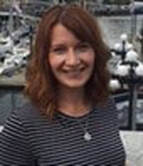 Biography. Jen is an academic detailer for the BC Provincial Academic Service since 2016 serving beautiful South Vancouver Island. She is passionate about translating evidence to practice, reducing polypharmacy and shared decision making. In her spare time, she enjoys running, gardening, travelling, and spending time with her family outdoors at the lake. Tags: Conference, Detailing Visits, Stigma Take a peek at the NaRCAD2022 conference materials on our Conference Hub.  Earlier this month, our team at NaRCAD hosted the 10th annual International Conference on Academic Detailing, “Celebrating 10 Years of Community Engagement.” We hopped on the virtual AD bus and heard from programs from across North America and beyond. This year, the conference featured campaigns focused on menopausal hormone therapy, initiation of antiretroviral treatment (iART), falls prevention, COVID-19, biosimilars, antiracist health care, polypharmacy, and opioids. The theme of community engagement was seen throughout the entire 3-day event, and we’re thankful to everyone who joined from around the world. Check out some of the highlights from our 2022 conference below.  Welcome Addresses:
Field Presentations:
 Breakout Sessions:
Expert Panels:
Special Presentation: “Looking Inward: AD as an Intervention for Antiracist Health Care”:
Real-time Roundtable:
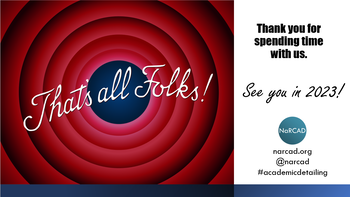 Thank you for all your engagement and support throughout the last 10 years of NaRCAD annual conferences! We are humbled to see how much the AD community has grown and are excited to be able to feature innovations at our conferences that have informed your work over the years. Our team at NaRCAD will continue to provide space for everyone to come together to share ideas, ask questions, and network. We look forward to seeing you in 2023. -The NaRCAD Team A special thank you to all of our NaRCAD2022 presenters as well as our partners at the Agency for Healthcare Research and Quality! Check out the NaRCAD2022 program book for more information on the presenters. Have thoughts on our DETAILS Blog posts?
You can head on over to our Discussion Forum to continue the conversation! 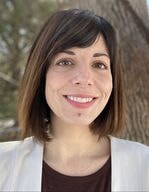 Bevin K. Amira NaRCAD Deputy Director Tag: Conference The “before times” are out of reach, and there’s a real beauty in that. Without forcing ourselves to look through rose-colored glasses, our team at NaRCAD has no other choice but to see you for who you are: creative, interconnected, and peer-led, now more than ever. You’re the bosses of adaptation, in ways you may not recognize, or even believe. So let me tell you more about who you are. To repeat an over-used word from society at large, “resilient” applies to our community, but it’s not the word that matters most. Being “resilient” overshadows other truths: we’re often tired, under-resourced, and we need peer engagement. All can be true at once, and they are. Our team is here to remind you that not only is needing each other more than okay, it’s to be celebrated. You’ve all responded to the AD-specific Bat Signal: you’re a mirror for each other, consistently boosting one another’s morale. The community you’ve built together is founded on the simple strength of admitting that we need each other, we need to feel good about where we are in this moment, and excited about where we’re going next. Where you’ve emulated that excitement most of all is during our community dialogues: our regular virtual gatherings, our Peer Connection Program, our shout-outs to one another during our convenings, trainings, and behind the scenes in 1:1 e-mails. We can have the most effective AD programs out there, but if we’re not witnessing each other’s reality, we’re going it alone.  At our 10th conference, we’re proud to see the arc of where we started a decade ago; where we were once focused mostly on data-specific outcomes, the focus is now on each other. From building a program to training and evaluation, no longer do we have community members who must start from scratch. NaRCAD is pleased to witness the shift from 2012, where we led the charge, to 2022, where you lead the charge. Thank you for being the collaborative innovators of this conference, and of AD successes across the globe. We look to you to lead us into 2023—for now, take in these next 3 days with pride. Have thoughts on our DETAILS Blog posts? You can head on over to our Discussion Forum to continue the conversation! Biography.
Bevin K. Amira, Deputy Director, NaRCAD Bevin manages NaRCAD’s strategic partnerships, building collaborations with public health leaders at the national and federal level. With career experience in building learning communities to increase engagement and sustainability, Bevin has expertise in creating interactive, interdisciplinary training curricula at healthcare-based non-profits. In collaboration with the dynamic NaRCAD team, Bevin facilitates NaRCAD's virtual and in-person learning sessions to encourage hands-on skill development and best practices sharing amongst peer programs. Read more. Aanchal Gupta, NaRCAD Program Coordinator Tags: Conference, Detailing Visits, Stigma, E Detailing, Opioid Safety Take a peek at the NaRCAD2021 conference materials on our Conference Hub.  Fresh from our move to Boston Medical Center, our team at NaRCAD hosted the 9th annual International Conference on Academic Detailing, a virtual event concentrating on “Cultivating Relationships for Community Resilience.” There were robust discussions on critical topics, useful tools shared, and connections built. With over 300 registrants from across the globe, the AD community continues to learn and grow thanks to your support and passion for this work. Check out some of the highlights from our 2021 conference below. Day 1 + 2 Welcome Addresses
Field Presentations
Breakout Sessions
Expert Panels
Special Presentation: “Detailer Training in Action: Ask the Experts”
Real-time Roundtable
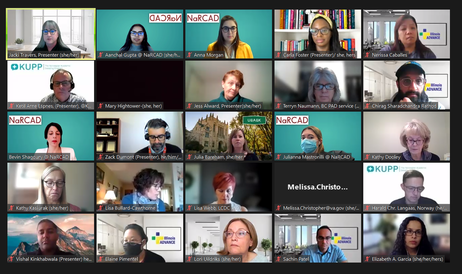 Our team at NaRCAD is immensely grateful for your continued feedback and insights during our conference. This community has a wealth of knowledge to share, and as we approach 2022, we plan to continue to facilitate opportunities to connect you with others in the field, create a space to have conversations about stigma, and support your needs in the field. We look forward to seeing you in 2022. -The NaRCAD Team A special thank you to all of our NaRCAD2021 presenters! |
Highlighting Best PracticesWe highlight what's working in clinical education through interviews, features, event recaps, and guest blogs, offering clinical educators the chance to share successes and lessons learned from around the country & beyond. Search Archives
|

